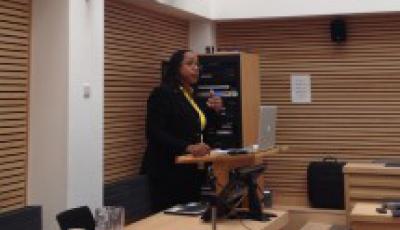Punishment, Citizenship and Identity: Reflections on Foreign National Prisoners
Posted:
Time to read:
5 Minutes
On March 24, 2014, Border Criminologies hosted the seminar Punishment, Citizenship and Identity: Reflections on Foreign National Prisoners in the Faculty of Law, University of Oxford. Convened by Mary Bosworth, Ines Hasselberg, and Sarah Turnbull as part of a European Research Council (ERC) funded project, this seminar brought together academic researchers from a variety of countries and disciplinary backgrounds to explore the confinement of foreign nationals in prisons. The presentations and related group discussions explored issues facing foreign national prisoners across a number of different jurisdictions: Central America, South America, North America, Europe, and South East Asia.

The first panel of the day focused broadly on issues of identity. Victoria Pereyra began by examining the racialised and gendered representations in Argentinian news media of incarcerated immigrant prisoners, relating it to enduring colonial discourses over mixedness and national identity. In the second presentation, Raquel Matos discussed the different trajectories of foreign national women prisoners in Portugal based on their countries of origin, and their reasons for migrating and offending. The women in her study had limited access to legal advice, and support for both release and post-release. They faced prejudice and racism from Portuguese prisoners. They struggled with issues of belonging, lost life opportunities by being imprisoned and facing deportation, and worries about their future and lack of options and support. Finally, Lirio Gutiérrez Rivera described her research at a Honduran prison with members of maras, gangs that were made up of young men deported from the United States. Lirio talked about the organisation and order of the prison system, how these young men experienced their identities as neither here (Honduras) nor there (America), reflecting a transnational sense of place and belonging.

Annie Bartlett and Can Yildiz presented work in progress on foreign national prisoners HMP Holloway. This research aims to investigate the challenges and exclusions foreign national women prisoners face while incarcerated, as well as their access to health and social care. Annie and Can the need to adapt research methods and analysis to accommodate the complex lived experiences of incarcerated women given the heterogeneity of the population. The presentation illuminated the challenges faced by these women, including the difficulties of having meaningful interactions with solicitors, the legal process, and prison staff. The foreign national prisoners spoke also of complex identities based on their long-term residency in the UK and fear of separation from their families.
Joaquina Castillo Algarra and Marta Ruiz García focused on the differences between foreign national and domestic prisoners in Spanish prisons, which created tensions between the two groups. The characteristics of foreign national prisoners was the basis for different relationships with prison staff given their higher education levels. Women’s stories of migration and offending were often linked to the need to support their families (as heads of families) and having limited alternatives to survive, which was made even more difficult by imprisonment. The foreign national women also preferred to work in prison to earn money to maintain their families. However, Joaquina and Marta noted that the current training and education programs offered in Spanish prisons don’t meet their needs.

Following Carolina, Rimple Mehta considered the meaning of borders among Bangladeshi women imprisoned in India for illegal border crossing. Many of these women struggled to understand how the shared cultural, traditional, and historical backgrounds of Bangladesh and India could translate in notions of nation, state, border, and criminal offences. For many of the women Rimple interviewed, their border crossings lacked ‘spectacle’ or fan-fare; they simply traversed a field or walked along a path. Popularised and state understandings of borders were not (yet) internalised by many of these women.
The panel’s third paper focused on policy and administrative changes to manage foreign prisoners. Steven De Ridder talked about his research in Belgium, a country in which 40% of prisoners are foreign nationals. The criminalisation of irregular migration and increased focus on early release to facilitate removal are noted policy approaches in Belgium. Steven pointed to prison practices of identifying undocumented migrants (which included checks of telephone calls and visitors list) and documenting identity (in exchange for early release). Such practices are increasingly linked to performance management metrics, including performance indicators tied to the number of expulsions of foreign national prisoners through early release.
The final panel session of the day involved high-energy presentations by Barbora Hola and Joris van Wijk on the rehabilitation of convicted war criminals, and Teresa A. Miller on the encroachment of civil powers into the penal system in the United States (US). Barbora and Joris identified the aims and measures of success of rehabilitation programs offered during imprisonment to this group of foreign nationals in EU countries (for ICTY) and Africa (for ICTR). They gave the example of one ICTY prisoner convicted of multiple rapes and held in a prison in Norway, highlighting the lack of training of prison staff, as well as the dearth of specific rehabilitation programs to deal with such crimes and this unique group of prisoners. Yet, the majority (84%) of convicted war criminals are deemed ‘rehabilitated’ by the ICT.

The Punishment, Citizenship and Identity: Reflections on Foreign National Prisoners seminar was well attended by a mix of community activists, students, researchers, and representatives from non-profit organisations, with approximately 50 participants in total. The event provided an opportunity for participants to learn about and discuss different aspects and accounts relating to the imprisonment of foreign nationals, as well as meet others sharing similar interests and concerns.
A selection of papers presented at the seminar will appear in a forthcoming issue of the journal Criminology and Criminal Justice, co-edited by Ines Hasselberg, Sarah Turnbull, and Mary Bosworth. Once published, Border Criminologies will be sure to blog about it, as well as tweet and post on Facebook!
Share:








